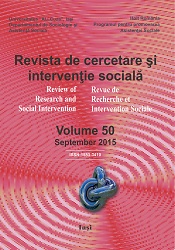THE PROCESS OF TRANSITION FROM PUBLIC CARE TO INDEPENDENT LIVING: A RESILIENCE-BASED APPROACH
THE PROCESS OF TRANSITION FROM PUBLIC CARE TO INDEPENDENT LIVING: A RESILIENCE-BASED APPROACH
Author(s): Gabriela Dima, Mihaela Dana BucuţăSubject(s): Social psychology and group interaction, Family and social welfare, Welfare services, Phenomenology
Published by: Expert Projects Publishing
Keywords: leaving care; resilience; community intervention; Bridges model of transition; interpretative phenomenological analysis; Romania;
Summary/Abstract: Young people leaving care are a group at high risk of social exclusion, as evidenced internationally in research on care leavers’ outcomes. Leaving care is a turning point in care leaver’s lives and pathways to independency vary according to young people’s characteristics and the social support received. This article uses Bridge’s model of transition adapted to leaving care to bring an in-depth understanding of the process of leaving care and young people’s experiences of leaving and after-care. The first part draws on a research study and discusses care leavers’ characteristics and outcomes based on Stein’s resilience categories, illustrated with three case studies. Data was collected by use of semi-structured interviews from 34 care leavers. The main method used for the qualitative analysis was the Interpretative Phenomenological Analysis, chosen for its potential to give voice to young people’s lived experiences and bring an in-depth understanding of the way they cope with leaving care. The second part, moves from research to practice, from identifying to promoting resilience. A programme to support care leavers transition is introduced and proposed as a resilience-focused and process-oriented model of intervention.
Journal: Revista de Cercetare şi Intervenţie Socială
- Issue Year: 2015
- Issue No: 50
- Page Range: 53-65
- Page Count: 14
- Language: English

